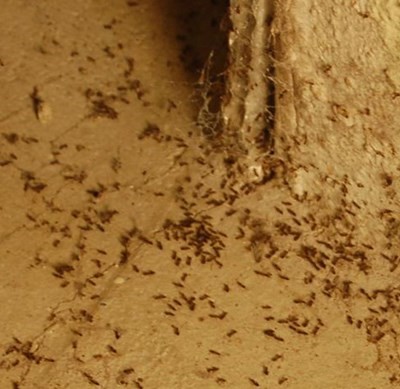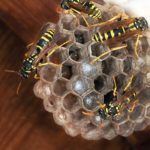
Have you ever seen ants in your basement and wondered what in the world they were doing down there? And how they could have gotten there without you noticing them moving throughout your house? This situation is especially perplexing when it’s an unfinished basement with none of the crumbs and spills that usually cause ants to be present. In these cases, what you’re most likely seeing are pavement ants. Here are some common questions we receive regarding pavement ants and their basement-invading behavior:
How do they get in?
Pavement ants get their name from their tendency to make nests in the cracks of and underneath slabs of pavement. Unfortunately, many areas in close proximity to your home are prime places for pavement ants to colonize (if you have seen large groups of ants having territorial wars on your sidewalk or driveway, it is likely two rival pavement ant colonies). When the nest is close enough to your house, the ants will inevitably find entry points in your foundation. Usually, these entry points are either cracks in the basement floor or walls, which are present in houses of all ages as a result of the house settling over time. There are also many unavoidable cracks and crevices created during the construction of the home. Under front porch slabs is a hotspot for these points, which is why pavement ants in the basement are often concentrated directly beneath the front door. Pavement ants, being only 2.5 to 4 mm long, are easily able to navigate all these cracks to enter directly into your basement.
Why do they want to be in my basement?
When people see ants in their house, it is usually assumed that they are foraging for food – and in many cases this assumption is correct. With pavement ants, however, food is almost never the primary driving factor. Paul Matusiak, Associate Certified Entomologist and Batzner Operations Manager, explained, “Environmental stressors are the main causes that bring pavement ants into a person’s basement. When we get a lot of rain, they will seek out a dryer environment, and when we go through extended dry periods, they look for the damp conditions of a basement. The same goes for fluctuations in temperature and humidity as well. Additionally, in the late summer pavement ants may expand indoors simply because their current nest is not big enough to sustain the number of ants in the colony.”
How can I keep them out?
By far, the most effective method for keeping pavement ants out of your basement is regular inspection and treatment. There are simply too many cracks and crevices in your basement for you to caulk them all, and new ones will form as the house continues to settle. Pavement ants can also chew through most sealants instead of finding another route into your home. Paul explained, “Unfortunately, for newer houses, this will likely be a recurring issue due to the construction methods of the last roughly thirty years. The only real solution is to be extremely thorough, both in your inspection and treatment. This includes pulling away insulation and other barriers so you can be aware of the full extent of the problem and treat it as effectively as possible.”
This level of thoroughness is best achieved by a professional, so please don’t hesitate to call us at 866-591-3519 or contact us at the first sign of pavement ants in your basement!
Need a pest control estimate?
We'll call you! Our representatives are fast and friendly.
Batzner Explains Mysterious Appearance of Ants in the Basement in Wisconsin
Serving Wisconsin





